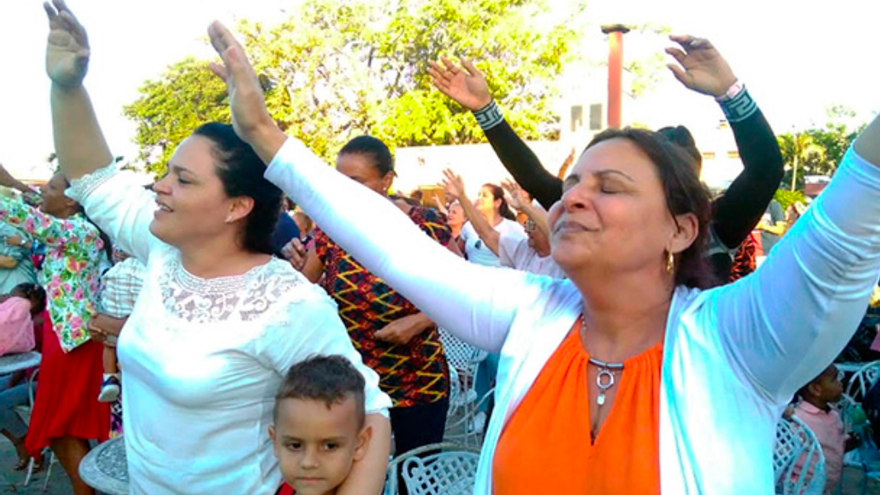
![]() 14ymedio, Havana, January 6, 2024 — An unusual article, which asks for God’s blessing “to the country and the province” during 2024, appeared this Friday in 5 de Septiembre, the Communist Party newspaper in Cienfuegos. The article describes a ceremony in which “numerous religious denominations”, such as the Church of the Foursquare Gospel and the Brethren in Christ Society, prayed for “love and unity” in the country in front of local authorities.
14ymedio, Havana, January 6, 2024 — An unusual article, which asks for God’s blessing “to the country and the province” during 2024, appeared this Friday in 5 de Septiembre, the Communist Party newspaper in Cienfuegos. The article describes a ceremony in which “numerous religious denominations”, such as the Church of the Foursquare Gospel and the Brethren in Christ Society, prayed for “love and unity” in the country in front of local authorities.
To leave no doubt about the “thematic axis” of the celebration, the pastors, the text adds, were even more specific and asked God “to support all the expectations of improvement to which Cubans aspire.” “Blessings to the nation and the city” followed, as well as “high-flying artistic numbers with careful stage composition.”
Immediately afterwards, Israel Curbelo, provincial representative of the ruling Council of Churches of Cuba, took the floor to thank “the facilities and willingness provided by the authorities of the territory” to carry out what he described as a “public act” at the Tropisur complex in Cienfuegos. He then spoke with the special envoys of 5 de Septiembre and gave an account of his organization’s agenda, in addition to reiterating his gratitude for the ceremony, “the fifth activity of this type that is carried out publicly in Cienfuegos.”
“Blessings to the nation and the city” followed, in addition to “high-flying artistic numbers and careful scenographic composition”
In another forum, no longer religious but digital, Cuban Foreign Minister Bruno Rodríguez criticized this Tuesday that Cuba and Nicaragua were included, for yet another year, in the list prepared by the US State Department of countries that violate religious freedom.
The echo of his statement, published on the social network X, did not appear in the official press. Several articles commented on Havana’s “exemplary performance” or – like 5 de Septiembre – covered events that, in their opinion, demonstrate that religion is not only tolerated but also encouraged in Cuba.
During the last weeks, and anticipating the publication of the list, Havana took several steps to clean up its image, among them the meeting of Miguel Díaz-Canel, on December 19, with Jerry Pillay, the general secretary of the World Council of Churches. The religious leader complimented the president and asked for the end of the US embargo on the island and the exclusion of Cuba from the list of countries sponsoring terrorism.
Pillay’s statements provoked outrage from several international religious communities, such as the organization Outreach Aid to the Americas (OAA), which in a statement on December 28 urged the reverend to “defend religious freedom in Cuba.”
“His visit, apparently closely orchestrated by the Cuban Government, has not provided him with an accurate understanding of the state of the fundamental right to freedom of religion or belief in Cuba. Worse still, we are seeing that the Cuban Government is using his visit, and specifically his statements celebrating religious freedom in Cuba, to reinforce his absurd claim that Cubans do enjoy this fundamental freedom,” denounced Teo Babun, the director of OAA.
Babun also commented on the “dark reality that the faithful live in Cuba” and asked Pillay to “raise his voice on behalf of the afflicted and oppressed in Cuba.”
Babun also commented on the “dark reality that the faithful live in Cuba” and asked Pillay to “raise his voice on behalf of the afflicted and oppressed in Cuba
An episode that exemplified Babun’s statement was the police summons, in December, of the evangelical bishop Jorge Luis Pérez Vázquez, leader of the Rehobot Ministry on the Island. The pastor published a video on social networks showing the document issued by the Police of Santiago de Cuba. “I want to record this and leave it as evidence. Our only ministry in this nation is to preach the gospel, help widows, orphans and prisoners,” he said.
For exiled Baptist pastor Mario Félix Lleonart , the summons – for which the cause was not clarified – constitutes another demonstration of the activity of “repressors and violators of religious freedoms in Cuba.”
The interest of the Cuban Government in gaining the support of the religious institutions of the Island has led it to meet on several occasions with their leaders to demonstrate the religious communities’ support for the State. This happened last June, when Díaz-Canel traveled to the Vatican to meet with Pope Francis. From the conversation, which was expected to handle delicate issues such as the release of political prisoners on the Island, only words of support for the regime from the Catholic headquarters remained.
Last September, the Bible Society of the Council of Churches was established, with a representation of Catholics and Greek Orthodox, who were not part of the group, made up mainly of Protestant churches. During the event, in which Caridad Diego – in charge of Religious Affairs of the Communist Party – was present, the representatives of the institutions sent bibles dedicated to Raúl Castro, Díaz-Canel and Esteban Lazo.
____________
COLLABORATE WITH OUR WORK: The 14ymedio team is committed to practicing serious journalism that reflects Cuba’s reality in all its depth. Thank you for joining us on this long journey. We invite you to continue supporting us by becoming a member of 14ymedio now. Together we can continue transforming journalism in Cuba.
